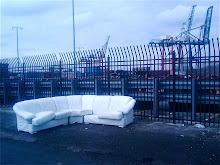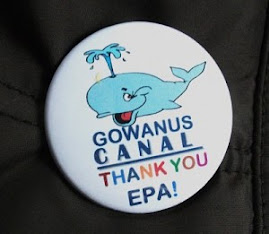Slightly annoying.
From speaking to a couple of people involved in this matter, it seems like the reason for this second postponement was due to a yet to be announced agreement that would, in the short term, subsidize the rate of electricity being supplied to the ships, thereby reducing the economic "burden" on the ship operators, Carnival, of plugging in and using electricity, rather than idling their engines and burning extra-dirty diesel (creating carcinogenic and otherwise dangerous emissions) while the ships are in port. This agreement was hinted at by a spokesman of Mayor Bloomberg in this recent South Brooklyn Post article, here, where the representative, Andrew Brent, is quoted as saying that the pending deal "would benefit all of the parties involved, and we're all working to finalize one."
This is obviously good news, and the deal, if secured, should ensure that there is a workable, quickly implementable short term solution to the frustrating stalemate that has been delaying the plan to get the cruise ships to plug in to shore power at the Brooklyn Cruise Terminal in Red Hook.
I don't see, however, how the news of this interim deal (even if it's in place for a number of years), takes away the urgency of getting a real, long term solution in place. That's exactly what this "Shore Power Resolution" was hoping to spur.
The resolution was urging the Public Service Commission, which has been dragging its feet on this case for two years, to finally create a "shore power tariff" - a special rate of supply of electricity - that would be supplied by Con Ed and would allow the ships to plug in at the Brooklyn terminal. This would be a permanent tariff, so it could be the piece that puts in place the long term solution that everyone has been waiting for.
This "shore power tariff", if created, could also set the precedent for other uses of shore power and the practice of "cold ironing" (ships turning off their idling engines) throughout the ports of New York and New Jersey. The Port Authority has said, in addition to its use at the Brooklyn location, that it would also like to bring "shore power" to the cruise ships visiting the Manhattan Cruise Terminals, and has outlined plans to create a new "cold ironing" berth at the Howland Hook Container Terminal in Staten Island. Presumably, these plans are all contingent on the creation of a "shore power tariff".
Adding impetus to this matter, there was also the news, this week, that the Ports of New York and New Jersey increased their business by 16% last year. A spokesman for the International Longshoremen's Association in Newark is quoted in this New York Times article, here, as saying, "We're doing super great". In an economy that's still struggling to find its feet, this is good news, but with the booming business, there comes more ship movements, more idling while in port and - unfortunately - more pollution and more people bearing the burden of the resultant negative health impacts - in cancer, asthma, heart disease and more. That's why it's so important that the Port Authority keeps driving towards 'greening' the operations of their ports. The use of "shore power" for ships should be a big part of any plan to do so, and the creation of this "shore power tariff" would surely create the incentive for the building the infrastructure to allow all types of ships to plug in - container, cruise and others - as has been the case on the West Coast and elsewhere.
The short-term solution, referred to by the Mayor's representative, won't do a lot (as far as I can see) to address this "bigger picture" issue - i.e. pushing the Public Service Commission to create a shore power tariff, so that the cruise ships can plug in at the Brooklyn Cruise Terminal, while also setting a precedent and encouraging the expansion of this life-saving and green-house gas reducing practice throughout the city's ports.
The "Shore Power Resolution" is pushing for this big picture, long term solution. (Read it at the end of this post).
So, I say, let's not delay this hearing any longer.
The Public Service Commission has already shown that it is capable of moving at a glacial pace.
I don't see why the City's Committee on Waterfronts should be mimicking them.
.



